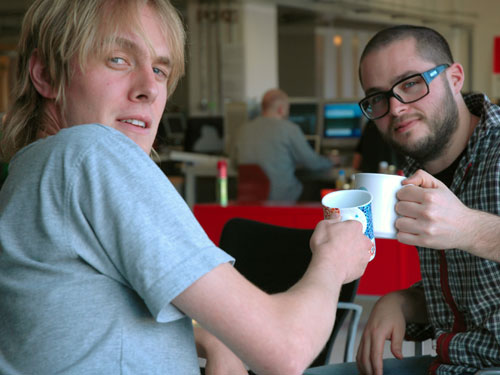
Trust the Brits to turn their obsession with drinking tea into a “turnkey b2b enterprise-level web-based tea management solution infrastructure.”
Londoner Nik Roope had grown so peeved with making cups of tea for co-workers without having the favor returned, he developed a website to bring order to tea-making duties. His site, Teabuddy, is social software for lovers of the leaf.
In British workplaces, where etiquette dictates that anyone venturing to the kitchen must make a cup for everyone nearby, tempers can boil if colleagues neglect their tea-brewing responsibilities.
“Open-plan offices may have revolutionized working patterns but, in the ever-polite U.K., it creates a situation where you can’t just make one cup, you must make one for everyone in the entire room,” said Roope, a designer with London-based creative agency Poke, where job applicants are vetted for their ability to make up to 18 cups a day.
“There are those who willingly accept their tea-making duties and those that don’t,” he added. “There are also those who, like a child, mess up the order (so) as to not be asked again. Some people are very determined not to make tea.”
So Roope’s Webby Award-nominated team of “Pokers” sharpened its PHP skills and set about building surveillance software to monitor who was pulling her or his weight in the tea rota protocol — and who was slacking.
Teabuddy lets co-workers create office groups online to record rounds and requests, complete with personalization options like milk and sugar preferences for individual colleagues.

Designers Iain Tait, left, and Nico Nuzzaci drink tea in the offices of Poke, creators of TeaBuddy.com.
Photo: Courtesy of Nicolas Roope
Before leaving for the kitchen, responsible brewers log onto Teabuddy and check a box next to the name of those for whom they are making a cuppa. Teabuddy tallies the total cups made and consumed by each employee, keeping a history that lists the date each user last poured forth — it’s “objective, factual proof of who’s done what and when,” according to a message on the site.
Teabuddy now tracks the refreshment habits of over 100 office workers around Britain, where tea is such a part of national culture that Poke is based in London’s Biscuit Building (biscuits are cookies, often dunked in tea); the agency is also producing the website for Tea Palace, an upmarket Notting Hill tea seller.
“Making tea involves a bit of a ritual,” said Stuart Payne, keeper of cult tea-and-biscuits web guide NiceCupOfTeaAndASitDown.com and co-author of a book on Brits’ fascination with the drink.
“Presumably some people find it a bit of a drag to make tea and will appreciate the extra labor-saving of having a computer decide who should do it,” he said. “Call me old-fashioned, but asking someone across the office ‘Would you like a cuppa?’ seems to work just fine.”
Payne said embedding kettles with wireless base stations to alert thirsty colleagues of imminent boiling was the only sure-fire solution to the chore of planning tea breaks verbally.
But data produced by Teabuddy could prove invaluable in picking out workers ripe for promotion. According to research from the British Tea Council, regular office tea-makers possess “top management skills,” are the most enthusiastic employees and are most likely to win the admiration of peers.
Roope added: “Making a cup of tea is a way of saying ‘Hey, I may be your boss, but I can deal with you as an equal human being.’ It’s obviously motivating and creates strong relationships.”
In the quest for a perfect cuppa, Teabuddy fans have been pestering the team of “tea-drinking nerds” with requests for refinements to the site, like the inclusion of Earl Grey and herbal teas.
“We may accommodate some of these developments in a version 2.0,” co-creator Iain Tait said. “However, one thing we will never do, ever, is add coffee.”
